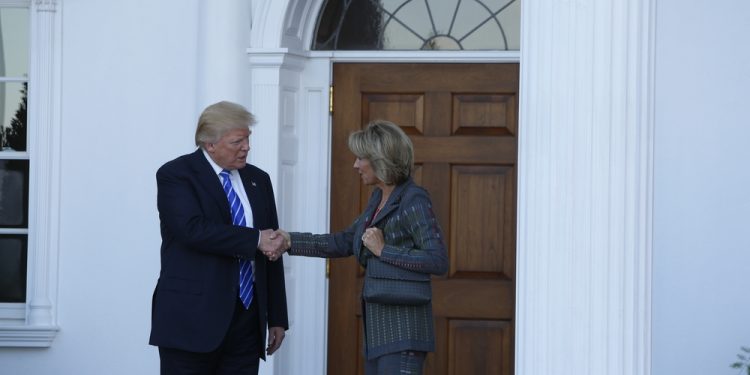
Paul E. Peterson has an insightful look at why dissatisfied public school parents have reason to cheer Betsy DeVos’ nomination since her support of school choice could expand opportunities for their kids
December 13, 2016

Paul E. Peterson has an insightful look at why dissatisfied public school parents have reason to cheer Betsy DeVos’ nomination since her support of school choice could expand opportunities for their kids
December 13, 2016
School Choice Might Be The Answer For Parents Who Want More For Their Kids.
The Wall Street Journal
Paul E. Peterson
December 13, 2016
When Donald Trump selected an advocate for school choice, Betsy DeVos, to be secretary of education, he was acknowledging what many parents have noticed for some time: District-run public schools aren’t educating students well.
Earlier this month the Organization for Economic Cooperation and Development (OECD) revealed that the performance of U.S. 15-year-olds on its Programme for International Student Assessment in math fell 18 points between 2009 and 2015. As the Obama administration was carrying out its main education initiative, “Race to the Top,” the United States was sliding further downward, falling from a tie for 26th place to a tie for 31st among the OECD’s 35 nations, coming out ahead of only Greece, Chile, Turkey and Mexico.
The news does not come as a surprise to American parents. My colleagues and I at Harvard University have uncovered a major discrepancy between the satisfaction levels of parents with children at public schools and those with children at private and charter schools as part of the 2016 Education Next survey, which is administered annually to a nationally representative sample of Americans.
Three-fourths or more of all parents with children in charter, public or private schools say they are either “satisfied” or “very satisfied” with the schools. But the percentages of parents who say they are “very satisfied” differ markedly across the three sectors.
According to our survey, 46% of private-school parents say they are “very satisfied” with the quality of their child’s teachers, and 32% of charter-school parents are equally enthusiastic, but only 23% of parents with students in public schools report that they are as satisfied. On the topic of schools instructing students in “character or values,” 59% of private-school parents report high satisfaction and 38% of charter parents, but only 21% of those sending their children to public schools do. Regarding school discipline, 46% of private-school parents are highly satisfied, 34% of charter-school parents and 17% in public schools. Questions about safety and expectations for students yield similar results.
Using an online survey, we were able to look at a representative cross-section of parents in the United States consisting of 774 individual parents with children in public schools, 426 in private schools and 317 in charter schools.
What we found is that parents with children in private schools are more likely to be homeowners, have higher incomes and college degrees. But charter parents, as compared with parents of students in public schools, have lower incomes, less education and are less likely to be homeowners. Twenty-one percent of charter parents are black and 36% are Hispanic, as compared with 10% and 25% in the public schools.
Public-school parents are more satisfied with the school’s location—probably because the school is typically a neighborhood institution. Also, they express greater satisfaction with extracurricular activities at the school. However, they are more likely to report as serious such problems as students destroying property, missing classes, fighting, and using drugs.
As we were completing our analysis, we unearthed a U.S. Education Department survey from 2012 that posed similar questions to a nationally representative sample of parents, and we found that the Obama administration has never reported the charter-school results from this survey, although the raw data are publicly available for others to analyze.
Digging into this data, we discovered that this survey, too, reveals both private-school parents and charter parents to be more satisfied with their schools than parents with children assigned to public schools. They are also more satisfied with teachers, academic standards, discipline and “the way the school staff interacts with parents.”
Among the 9% of parents who choose for their children to attend schools such as public magnet schools and other schools that require students to pass admissions exams or show evidence of academic excellence, satisfaction levels are comparable to those at charters. But magnet and exam schools have greater resources and run more specialty programs in math, science and the performing arts. Meanwhile, most charters have more limited resources and accept all applicants unless too many people subscribe, in which case they hold a lottery.
Given the higher satisfaction levels at private and charter schools, and the hundreds of thousands of parents on wait lists for charter schools, public schools are under pressure. By appointing Betsy DeVos, Donald Trump is listening to parents and acknowledging that it’s time to begin thinking outside the public-school box.
Mr. Peterson is professor of government at Harvard University, where he directs the Program on Education Policy and Governance, and a senior fellow at the Hoover Institution.